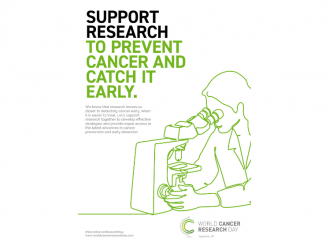Sep 22, 2022
ASCO is observing World Cancer Research Day on September 24, 2022, as an opportunity to raise awareness about the importance of cancer research and how learning more about cancer causes, risk reduction, and early detection are crucial to helping control the disease.
Each year, World Cancer Research Day has a theme, and this year it is equity, with a focus on ways to address global cancer health disparities, particularly in the areas of risk reduction and early detection research and care. The goal is to raise awareness of the critical need for equity and diversity in cancer research and training, as well as enabling all communities to identify the disease earlier and treat it more effectively to help achieve equitable outcomes for all.
“Cancer research needs to be inclusive in order for it to be most effective,” said ASCO chief medical officer and executive vice president Julie R. Gralow, MD, FACP, FASCO. “We need to ensure that all types of diversity are represented in our cancer research community, our patient population that’s enrolling in clinical trials, and our workforce pipeline of future researchers and physicians. Learning from all patients, providers, and researchers gives us our best chance to provide high-quality care to all patients and build the biggest knowledge base.”
ASCO has been focused on using research as one of the tools for achieving quality cancer care for everyone around the globe as part of its strategic plan.
One recent action the Society took was signing a memorandum of understanding (MOU) with the African Organisation for Research and Training in Cancer (AORTIC) to collaborate on advancing cancer research in Africa. The MOU will harness the respective programs, leaders, and member networks of both organizations and foster researcher training, mentorship and funding opportunities, and the presentation of research findings.
One of the first initiatives the two organizations are working on is bringing a regularly scheduled ASCO International Clinical Research Course (ICRC) to Africa. ASCO has been offering ICRC courses for more than 10 years and has previously held them in Morocco and South Africa. Through the MOU with AORTIC, the courses would be held biennially at the AORTIC International Conference on Cancer in Africa. The courses aim to increase understanding of clinical trials methodologies, implementing research ideas, evaluating literature, and ways for young investigators to get involved with research.
For cancer research being conducted in the U.S., ASCO established a new cooperative agreement with the Association of Community Cancer Centers (ACCC) to ensure that cancer clinical trials better reflect the diversity of people with cancer.
Following input from the oncology community and a pilot program, ASCO and ACCC released the ASCO-ACCC Equity, Diversity, and Inclusion Research Site Self-Assessment (Site Self-Assessment). This online tool is designed to help research teams identify potential opportunities to improve equity, diversity, and inclusion in clinical trials while doing an internal review of existing policies, programs, and procedures.
The two organizations also published a joint statement in the Journal of Clinical Oncology (JCO) that outlined recommendations for achieving equity, diversity, and inclusion in clinical trials. As explained in a commentary published in JCO Oncology Practice, “These recommendations include education and training of the research teams to help them develop cross-cultural competencies, effective communication, and trustworthiness; routine evaluation of the site's performance and impact of the [equity, diversity, and inclusion (EDI)] goals; investment and engagement in programs, policies, and procedures that promote EDI and incorporate accountability mechanisms; inclusion of patients and communities as partners in the research process; investment in the hiring and development of a diverse workforce and programs that build capacity for supporting the enrollment of diverse populations in clinical trial research (such as navigators, ambassadors, and other clinical trial advocates); and finally, collection and sharing of EDI evidence and best practices.”
Throughout the year, ASCO is maintaining the momentum for more equitable cancer research and clinical trials through articles, reviews, and commentaries in its journals and educational sessions at its meetings. The 2022 ASCO Annual Meeting featured several Education Sessions focused on discussions of how patients with cancer can have equitable access to clinical trials. As a component of that meeting, an ASCO Educational Book article was published in June, “Strategies to Advance Equity in Cancer Clinical Trials.” The article detailed elements of trial matching that affect patient access, clinical trial site strategies that can advance equity, and ways to increase rural populations in clinical trials. The upcoming ASCO Quality Care Symposium, being held September 30 through October 1, will feature an abstract track on “Health Care Access, Equity, and Disparities” with more than 230 abstracts.
The work to increase equity and diversity in cancer research and clinical trials is ongoing, and ASCO will continue to convene the oncology community and provide thought leadership as we strive for equitable care for every patient, everywhere.
Additional Articles and Resources
- Read a blog post commemorating World Cancer Research Day by Cancer.Net editor in chief Jyoti Patel, MD, FASCO.
- Read about a past International Innovation Grant (IIG) recipient, Liliana Vásquez, MD, MSc, who developed and launched ONCOpeds (Pediatric-Early-Diagnosis-System) in Peru. (Learn more about the IIG.)
- Read about a past IIG recipient, Raya Saab, MD, who developed a program to train pediatric providers and enhance communication between primary and oncology care.
- View information from our patient website, Cancer.Net, on cancer research and clinical trials.

